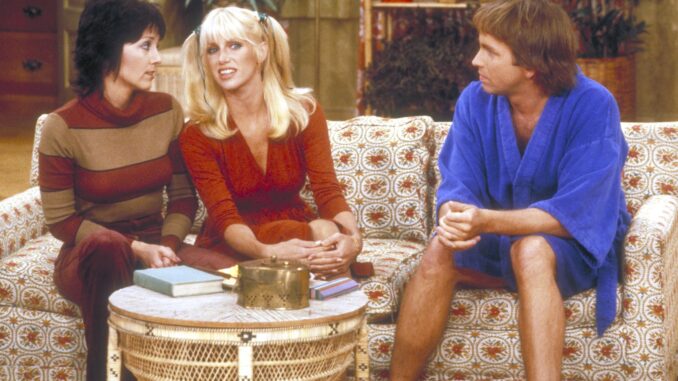
If you’re old enough to remember the 1970s heyday of ABC sitcoms, you’ll recognize the set of 3C the second you walk into the theater.
The kitchen to the right through a swinging door, two bedrooms off the back of a step-down living room, the arched front door angled for prime visibility: It’s Three’s Company.
As the lights go up on two young women on the couch in their skimpy sleepwear—a buxom blonde in a short nighty, a more androgynous brunette in a nightshirt and knee-high socks—your suspicions will be confirmed. 3C, David Adjmi’s new off-Broadway comedy, is a send-up of the legendary, naughty sitcom, the one that launched John Ritter and Suzanne Somers to stardom, and Joyce DeWitt to…well, something less.
The characters’ names have been changed, but otherwise the details are the same: Two women in Southern California need a roommate, a strange man shows up after a party and needs a place to live, and the three become roommates, with the understanding that the man will have to pretend to be gay so the cranky landlord will permit them to live together. The pacing has been sped up slightly, the language has gotten a shade saltier, and the bawdiness has tipped into raunch, but 3C starts out as a delicious send-up of Three’s Company, transforming the show’s goofy, upbeat, adolescent humor into something darker and more desperate, full of nervous energy. It’s a very promising beginning. But while it took the TV show a few seasons to go off the rails, 3C stops working within the first half hour, and never regains the promise of those opening moments.
Hannah Cabell is winning as Linda, the brainy but insecure brunette. (“I’m like Jo from Little Women—I’m independent,” she says.) And Anna Chlumsky is equally sharp as blond floozy Connie. (“If you flirt, you flirt with danger,” she says. “I learned that the hard way.”) Together, the two get some marvelous laughs with their rapid-fire, frequently contentious repartee. They’ve taken their characters beyond carbon copies of their TV originals: Connie is more cunning and intentionally sexual than Somers’ oblivious Chrissie, while Linda is more anxious and pitiable than DeWitt’s self-confident Janet. When these two women are alone in the apartment—whether they’re dishing about men, or showing off their surprisingly expert disco moves while “Push, Push in the Bush” spins on the record player—3C is a fun place to visit.
Things slow down a bit when the young men arrive. Jake Silbermann has a certain sad-puppy-dog appeal as third roommate Brad, but he doesn’t bring enough humor to the part to keep up with the women; he’s too serious, too troubled, and doesn’t quite mesh. Upstairs neighbor Terry, played with relish by Eddie Cahill, upsets the balance in the other direction. His Casanova routine reads more sleazy and ugly than macho and silly, and his exaggerated ’70s look and cocky strut lack the nuance that makes the women’s portrayals work.
But things really take a horrible turn when the landlord and his wife enter. As Mrs. Wicker, Kate Buddeke might share a few things with the original series’ kooky Mrs. Roper—particularly a penchant for chunky plastic jewelry—but here, she’s a pill-popping, nasty old lady with a nervous disorder and a mean streak. She’s no match, though, for her husband, played with truly ugly viciousness by the normally wonderful Bill Buell. The show’s original landlord, Mr. Roper, was a clueless oaf with some archaic ideas about women and gay people; 3C’s Mr. Wicker is a deeply hateful man who sexually assaults women (shoving his hand down Linda’s panties) and berates his new tenant as a “faggot” so many times, and with such vitriol, that he retains no sympathy.
Adjmi might have made a strong point about how much popular culture has changed—what seemed perfectly acceptable only recently that sounds jarringly offensive today—by turning up the volume on Three’s Company’s gay jokes just a touch.
The things Mr. Roper once said as a tease, or the way Jack used to mince around to reinforce his fake gay identity, would surely strike our ears differently today. But in 3C, the volume is turned up so high, and the tone changed so much, that it’s mostly just painful. Between Mr. Wicker, Mrs. Wicker, and Terry, the word “faggot” must be hurled at least fifty times at Brad during the show, always landing like a punch in the face—and, in fact, one time landing with a punch in the face.
There’s a way to take explicit viciousness and blind hatred and turn them into hilarious comic farce—see, for instance, any number of Christopher Durang plays—but here, it’s more cringe-worthy than enlightening or uncomfortable in a telling way.
The fact that in the play, unlike the TV show, Brad turns out to actually be gay, only serves to turn the closing portion of 3C into a limp melodrama, somewhere between a Greek tragedy and an after-school special. This 90-minute play seems to drag on far longer.
You’ll be wondering what ever happened to those promising opening moments, when Linda and Connie drank wine and talked about getting laid and listened to Giorgio Moroder records while showing off the latest dances they’d learned. (Credit to choreographer Deney Terio, the disco legend who taught John Travolta to dance for Saturday Night Fever.) 3C should have learned what Three’s Company, or any sitcom, already knows about this kind of comedy: After 22 minutes, roll the credits, and say goodnight.
3C is showing at the Rattlestick Theater, 224 Waverly Place. Tickets are $55. Call 212-279-4200.
